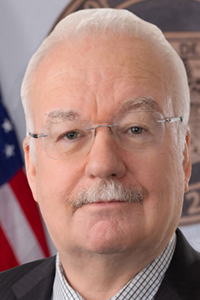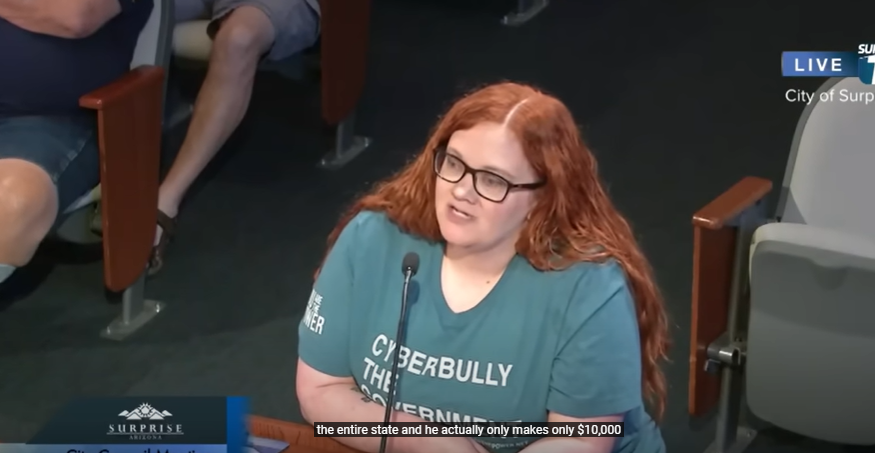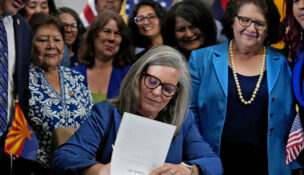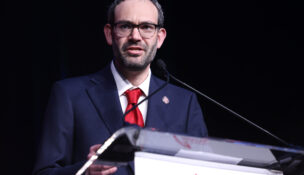Kavanagh wants Surprise probed over alleged free speech violation
Hannah Elsmore Arizona Capitol Times//September 11, 2024//
Kavanagh wants Surprise probed over alleged free speech violation
Hannah Elsmore Arizona Capitol Times//September 11, 2024//
Sen. John Kavanagh, R-Fountain Hills, is asking Attorney General Kris Mayes to launch a probe of the City of Suprise’s public comment policy after a woman was arrested while speaking at a city council meeting on Aug. 20.
Rebekah Massie attended the Surprise City Council meeting with her 10-year-old daughter to speak in opposition of a proposal to increase the city attorney’s salary.
Near the second hour of the meeting, Massie was speaking before being cut off by Surprise Mayor Skip Hall, who said she had violated the rules for public comment.
“Do you want to be escorted out of here?” Hall asked Massie.“Oral communications during the city council meeting may not be used to lodge charges or complaints against any employee of the city or members of the body.”
“That’s a violation of my First Amendment rights,” Massie replied.

Hall asked Massie if she wanted to be escorted out of the building while she repeated that he had violated her rights and acted in an unconstitutional manner.
Massie was arrested and subsequently charged with criminal trespass in the third degree for knowingly remaining unlawfully on property after being asked to leave, according to case records.
On Tuesday, Kavanagh sent a letter to Mayes’s office to formally request that she investigate the city’s public speaking policy.
Kavanagh said he was following media coverage of the dispute and had waited to file the complaint “to give the Mayor and Council or manager an opportunity to correct the situation.”
“Arizona’s open meetings law specifically states that – if you have a call to the public – the individual can comment on any issue within the jurisdiction of the public body, and clearly, the salary of the town attorney and the performance of the town attorney… fall within the jurisdiction of the council,” Kavanagh said. “So, she should have been allowed to make those comments.”
Kavanagh said “if there are any questions as to whether those comments are allowed,” the state’s open meeting law states that “any discrepancies or questions about it should be resolved in favor of free speech.”
He said open meeting law allows members of the public body torespond to criticism made by those who have addressed the public body, so “if council members can respond to criticism, it obviously allows criticism.”
The passage of SB1487 in 2016 permitted Arizona lawmakers to ask the Attorney General to investigate whether an official action taken by the governing body of a city or town violates state law or the constitution.
Kavanagh submitted the complaint to Mayes to ask that she investigate whether the council’s rule is illegal. Alongside his letter, Kavanagh said he submitted a two-page legal analysis from the Senate Rules attorney which outlines potential violations of the law.
If the Attorney General’s office finds the public comment regulation to stray from state law, Kavanagh said that Surprise city officials must scrap the rule or forfeit its state-shared revenues.
A spokesperson for the AG’s office confirmed that they received Kavanagh’s letter and will “fulfill its statutory duties under the law and evaluate the Senator’s request for a 1487 investigation.”
The AG’s office declined to comment on further details of the investigation as it is pending.
The probe falls parallel to Massie’s own lawsuit against the city and what she calls an “unconstitutional decorum rule.”
Massie is a regular attendee of city council meetings, the complaint said, and so is Quintus Schulzke, the second plaintiff in the suit.
The complaint alleged that the city’s criticism policy violates the U.S. Constitution’s First Amendment by allowing the removal of speakers not only for actual disturbances but also “simply for speech that officials dislike.” The complaint also alleged that the council’s actions violated the Fourth and 14th Amendments.
“I fear that I will be ejected or detained if I make a negative comment about a city official if I were to speak at City Council meetings,” Schulzke said in a declaration submitted to the court in support of a preliminary injunction.
Massie’s arraignment is scheduled for Sept. 25 in the Hassayampa Justice Court.
“Protecting freedom of speech, especially in public government settings, is incredibly important to our democracy,” Kavanagh said. “Regardless of where they stand, members of the public deserve the opportunity to voice their opinions and concerns to city leaders.”














































